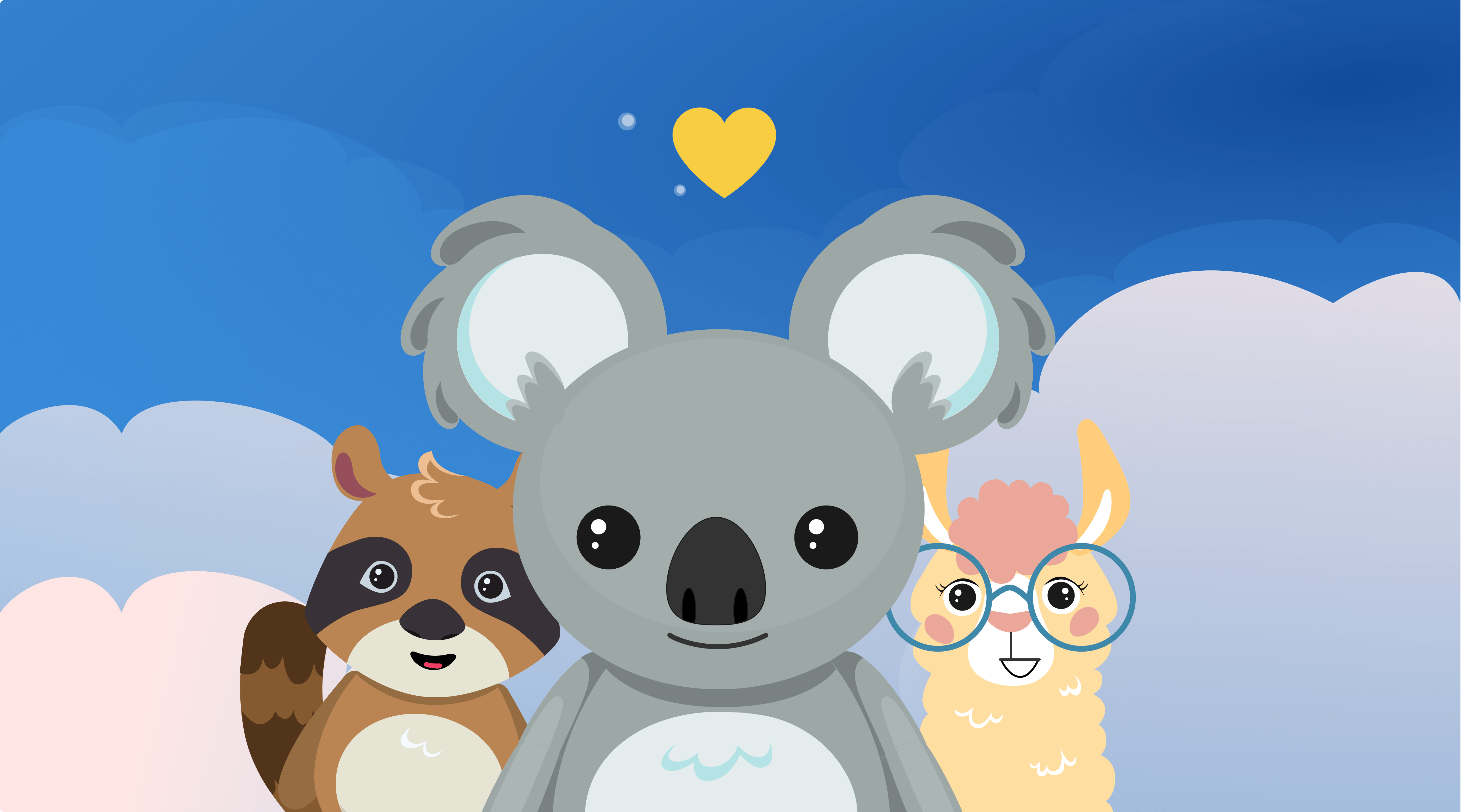
Problem/Opportunity
Insomnia can lead to physical and mental health problems, and even misdiagnosis and inappropriate treatments.
CBT-I has been proven to be an effective treatment for insomnia, with a success rate of 90% or higher, but
access to therapists is limited.
Digital solutions are becoming more accessible and affordable, yet user retention is still a challenge. Studies
suggest that in-app mood monitoring and human feedback could help improve user retention rates. Which could be
addressed through pet- caring game mechanics.
Solution
Pocket Kado - a virtual pet game that explores the key concepts of CBT-I and addresses the 24-hour behavioral
problem of insomnia.
Establish the basis of a virtual pet game that encourages users to alter their off-game behavior.
Impact
Pocket Kado app achieved a compelling core loop with strong results:
● 61% of DAU (daily active users).
● 50.4% of D1, 18.7% of D7 and 11% of D30 retention.
● Establish a meaningful connection between the product strategy and user needs/pain points
● Plan, lead and create insights from user interviews
● Create user research repository
● Define user flows and wireframes
● Create interactive prototypes using Figma
● Design High Fidelity Mockups
● Create a component library
● Documentation
● QA (Quality assurance)
● Creative direction
Poor sleep has a serious impact on mental and physical health, often leading to
misdiagnosis and unnecessary
treatments.
Doctors have recognized Cognitive Behavioral Therapy for Insomnia (CBT-I) as the gold standard treatment for
insomnia with over 30 years of research showing over 90% efficacy but there's less than 1,000 sleep therapists
worldwide (source).
The lack of CBT-I resources is contributing to a global mental health crisis, with 2B+ adults suffering from
insomnia and up to 3% of GDP lost in productivity.
To avert a global mental health crisis, scientists are urging for CBT-I to be scaled up and made more
accessible (source).
“Usually when I lay down, that's where my mind will start to race. So I usually have a really hard time going to sleep because that's when I'll think about if I have deals or if I have anything to do the next day. It's been that way for probably the last ten or 15 years.”
Tiffany
“I'm like one of those where if I can avoid medication, I will. I know. A while ago my doctor asked me to start the melatonin. It helped me fall asleep quicker, which was not really the problem, but it didn't help with keeping me asleep throughout the night.”
Debra
“I've been having sleeping disorder for two years now. I've been having issues with falling asleep. Most times at night I don't sleep, I'm always restless, I can't sleep. I play games when I can't sleep. I try to watch movies, I try to go to Netflix, just a couple of movies. Or most times I just try to read or just do something that would get me just tired.”
Roselyn
Low retention on other digital solutions
While digital platforms have increased affordability and access, yet low user
retention remains a challenge.
10,000+ mental health apps make it hard for patients to decide which ones to trust. Subjective user engagement
indicators can be dangerous (source). Doctors can't assess
the risks and benefits objectively (source).
Even
with employer-funded programs, utilization rates are low (3-4%) (source).
Studies have found that the dropout rate for mental health apps is high (source) but also that the dropout
rate was lower in studies offering human feedback and in-app mood monitoring, which could be addressed through
our pet- caring game mechanics.
Opportunity
Casual games or avatar-based wellness apps have demonstrated significantly higher
day 1 and day 30 retention
rates compared to meditation apps. There is an opportunity to leverage the game modality and offer an
effective and sustainable way to deliver CBT-I.
Apart from increasing retention, the pet effect can be a great source of mental health support: habri’s survey
revealed that 74% of pet owners saw an improvement in their mental wellbeing (source).
Take care of yourself by taking care of your pet.
Virtual pets have been shown to be effective in therapy modalities crossing cultural and generational
boundaries from children with learning disabilities to the elderly (source). Insomnia is a
24-hour
behavioral problem that we are solving through gameplay.
Pocket Kado offers a scientifically-backed solution to insomnia, incorporating key concepts of CBT-I into an
engaging experience and where every feature is evaluated by our medical advisors.
Our app encourages users to establish a meaningful connection with their game character, translating
out-of-game actions into in-game progress.
Relationship is key for therapeutic success. We are creating a digital relationship to motivate and help people achieve these goals - The Kado effect
● Earning points for putting the phone away
● Winding down techniques based on CBT-I journaling
● Using the earned points to feed and do activities with the pet
● Getting different rewards from the pet based on his habits
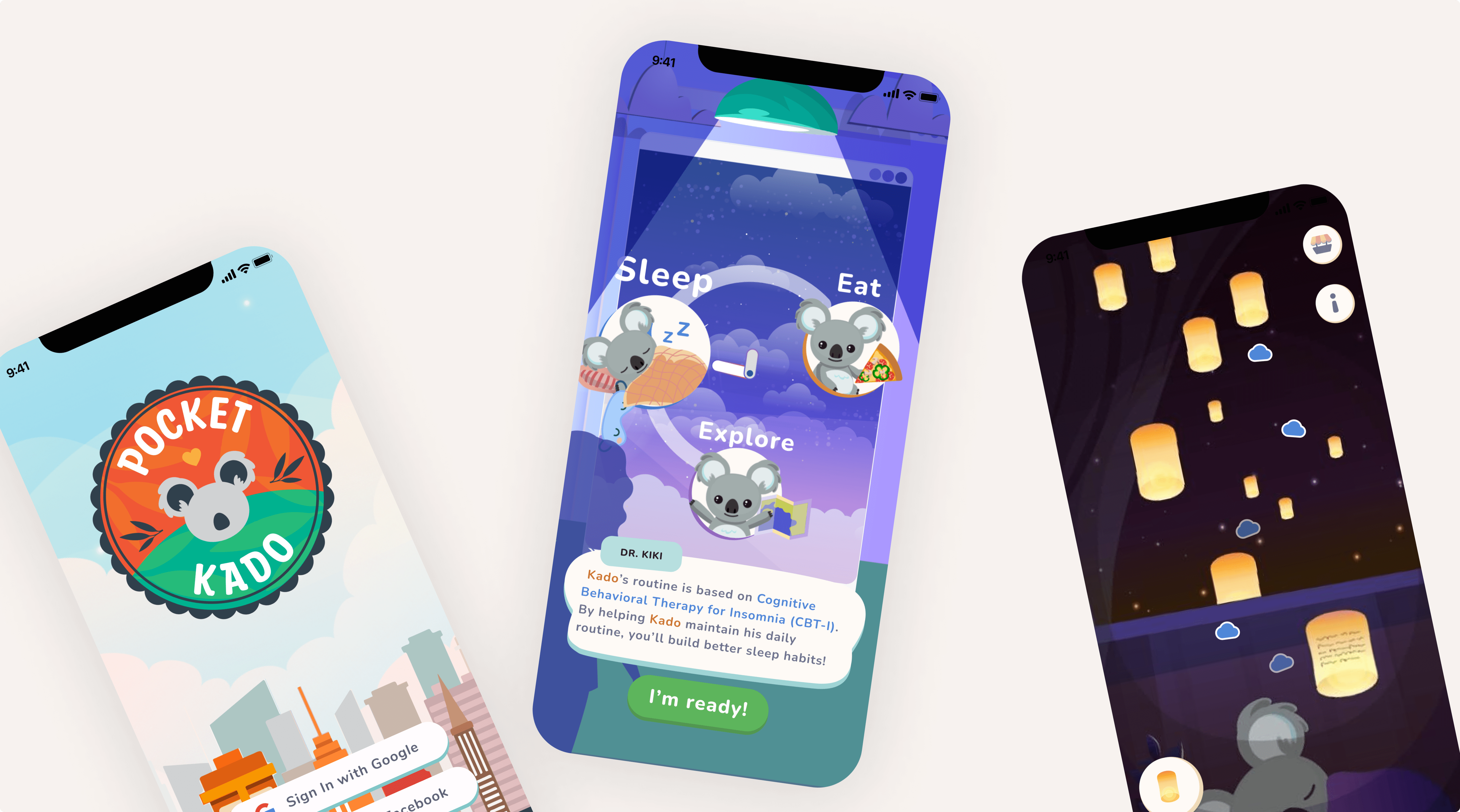
We conducted different studies to gain a comprehensive understanding of people's sleep quality and the
methods they use to try to sleep as also usability studies on our proposed solution.
Together with the product team we organised some rounds of user interviews, we conducted stakeholder
interviews, competitive analysis, concept validation studies and non-moderated usability tests.
Through these different studies we were trying to understand the effectiveness, the marketability, and the
usability.
We interviews hundreds of womens in USA, in different positions with various ranges of salary incomes and
responsibilities.
Insights & Takeways
Sleep deprivation increase people anxiety and decreases their life quality.
Those who were taking pills without committing to a sleep therapy would drop-off.
A natural solution and opportunity to learn is important to people when they are trying to find a solution to their insomnia.
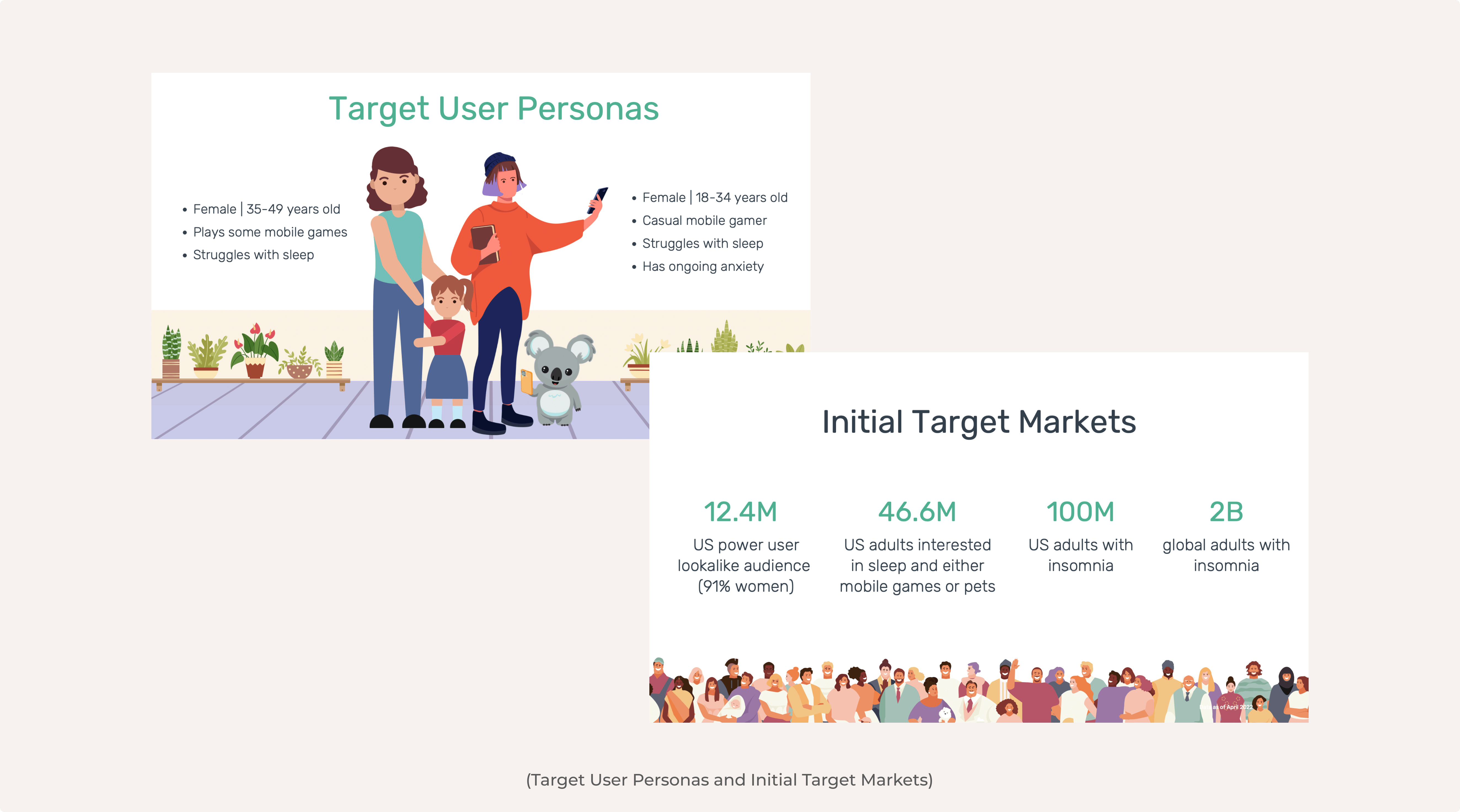
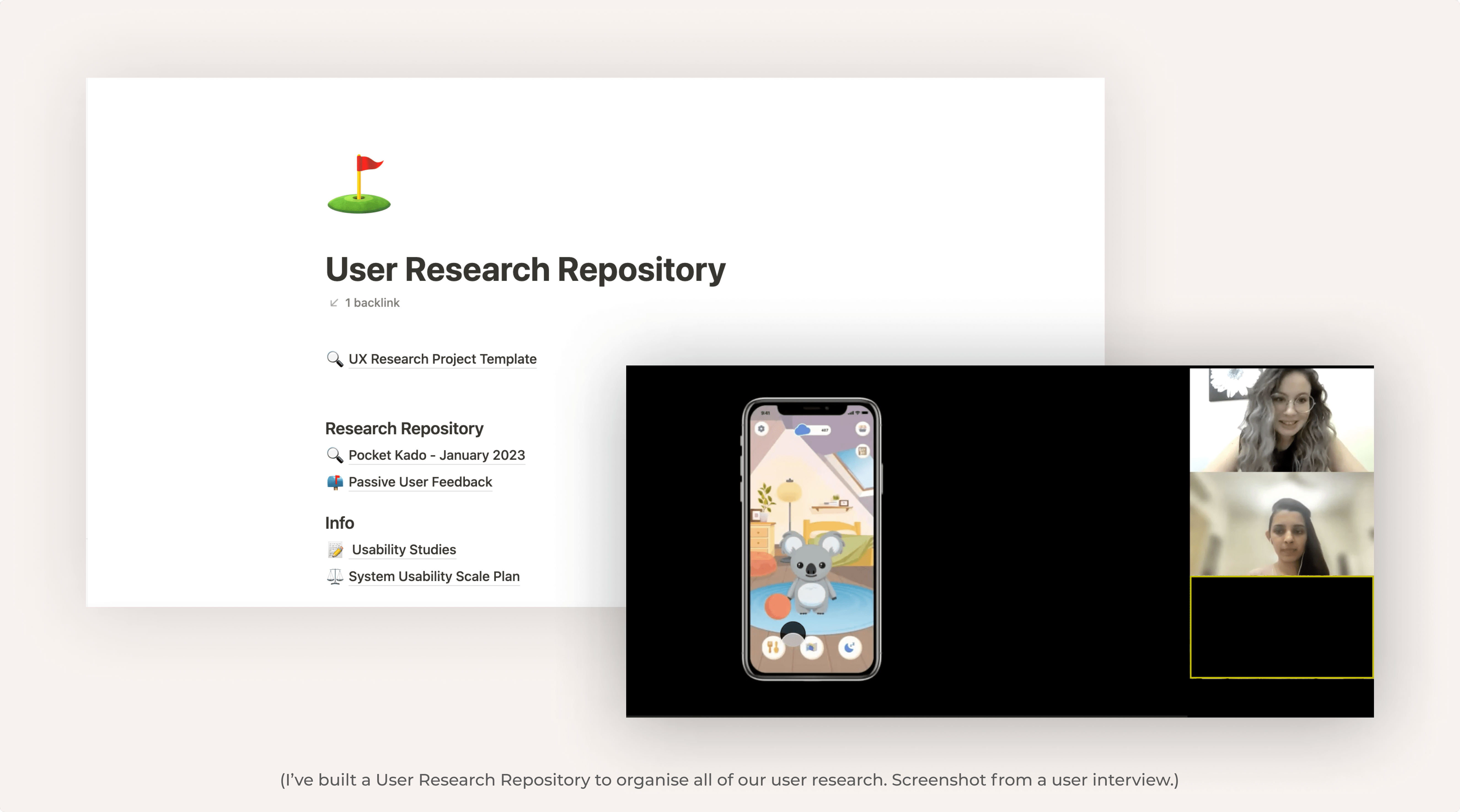
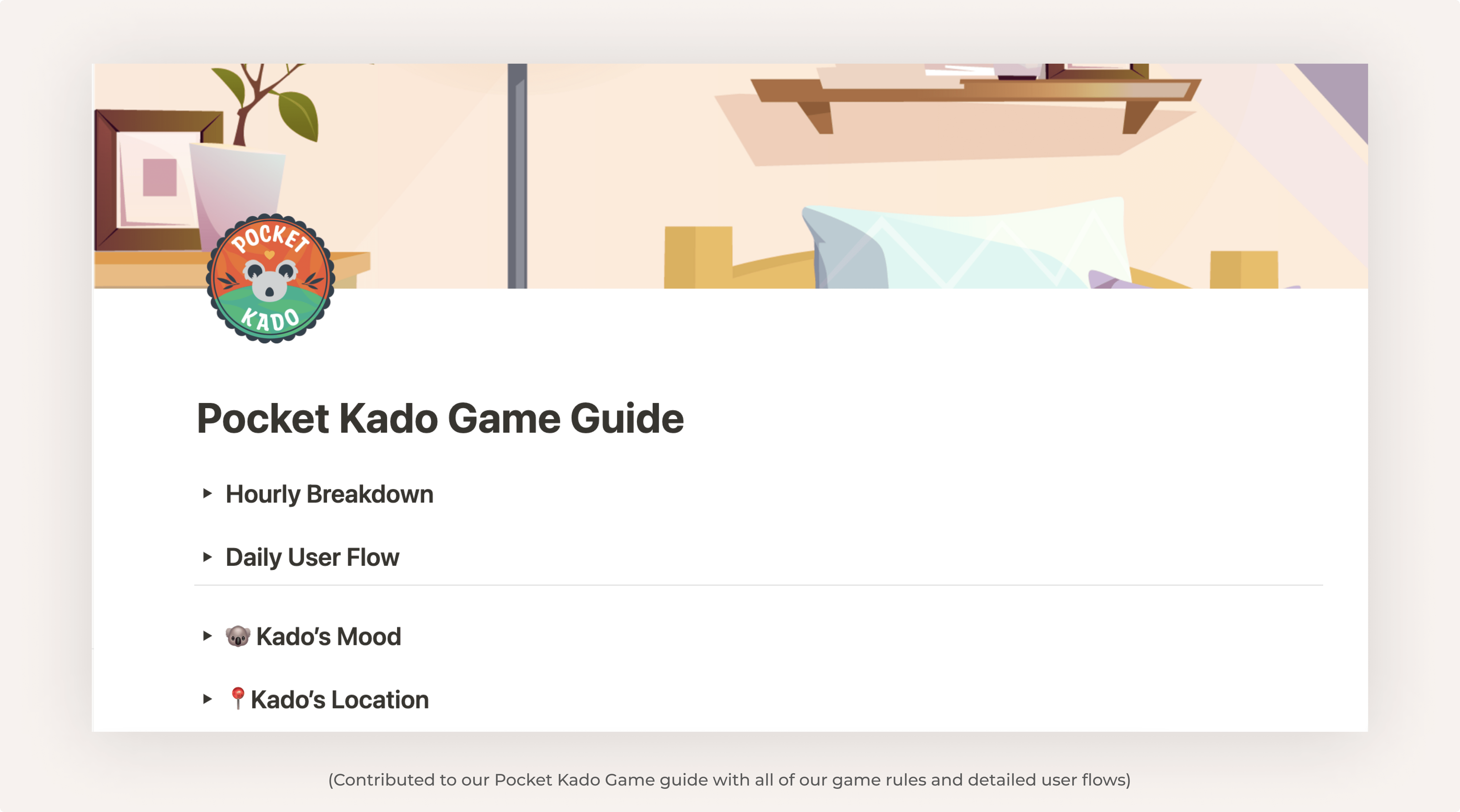
My role on user research went from planning (which method and research goals) to users recruitment, creating
the research plan and organising insights.
● Some tools we used on our user research:
● User Interviews - platform to recruit users
● Miro and FigJam to create insights from
user feedback
● Amplitude - for quantitative data
● Notion - to plan and document each interview
● Looppanel - to auto-record and transcribe the interview
● Maze - to validate early concept ideas and running usability testing across
prototypes and wireframes
Since user research was shared by design and product, I created a User Research Repository, to centralise and
make user research easily accessible to everyone, bringing awareness to user research.
The Kado Effect is the development of a digital symbiosis between the user and the game character. We’re establishing a link between out-of-game actions and in-game experience through a 24h core loop.
Sleep mode
Kado is a virtual pet whose routine mirrors the user’s. At their bedtime, users put Kado to bed and they earn
one Dream Mile for every minute that Kado is asleep. Kado wakes up if the user minimize the app or use their
phone.
This is how we’re directly incentivising the behaviours that lead to better sleep.
Dream Miles are our game currency, where we built a system around, so the user can redeem them for items and
activities that support Kado’s wellbeing.
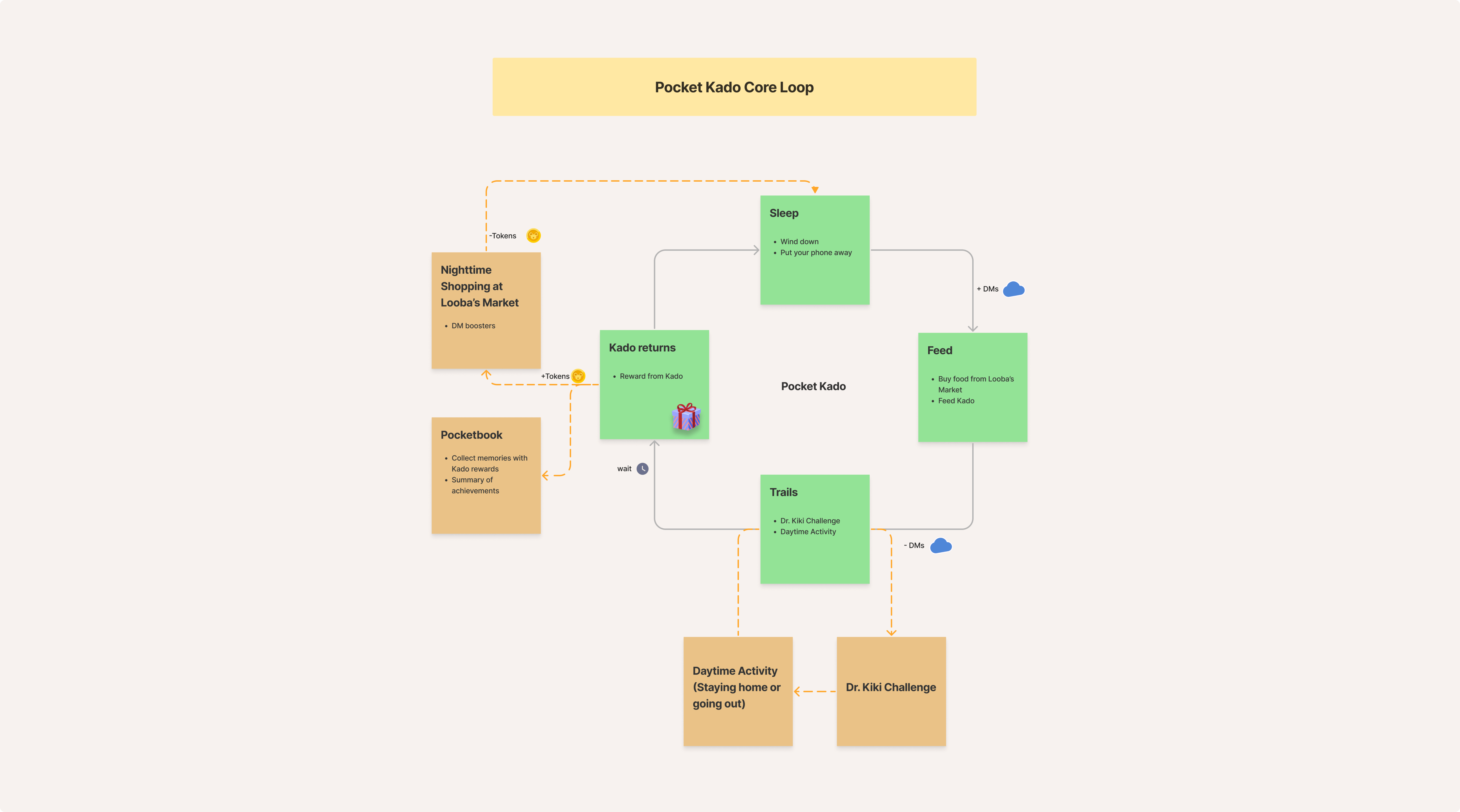
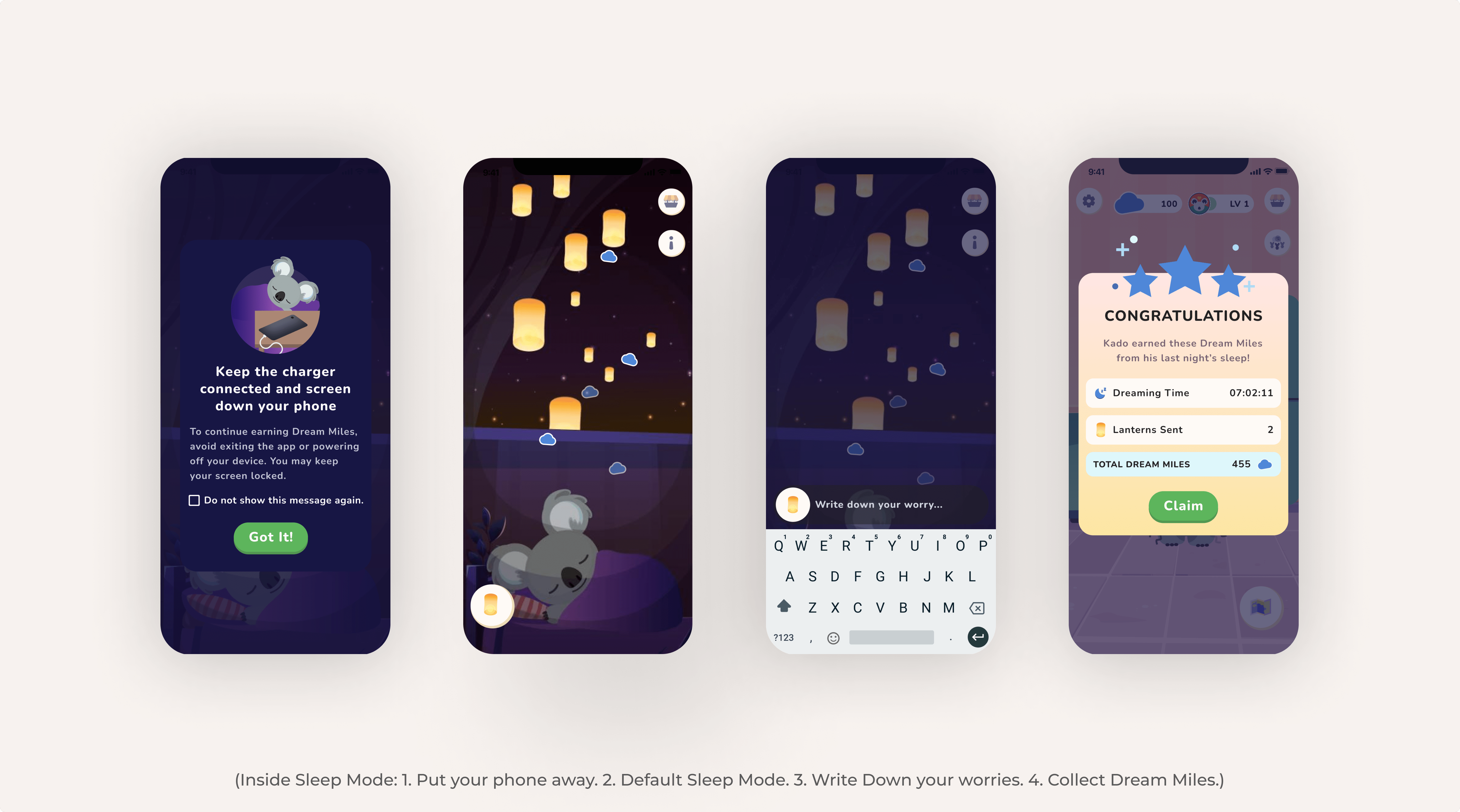
After a few iterations and releases we got to a well-performing baseline. The foundation was in place so we could gather valuable data, optimise the journey, and start to introduce other core features to the journey.
Insights & Takeways
With a D1 Retention of 50.4% our initial hypothesis was that we would see the retention normally reserved for games. But we we’re also seeing the longterm retention ( D30 - 11%) that usually is seen in wellness apps.
(Pocket Kado data from Apr 1, 2022 - Apr 30, 2022, n = 7,128)
DAW/WAU
Average session duration
Of users purchase an item
Of users collect Dream Miles
Average session length per night
Dream Miles earned per night (mean)
(Pocket Kado data from Apr 1, 2022 - Apr 30, 2022, n = 7,128)
“I would never thought just a little Koala app could take my brain and shut it off so that I can sleep.
I don’t know how it’s working, but it’s actually working.
I used to get excited when I slept for 3-4
hours. But now I’ve watched my time on my Fitbit that it’s gone from 3-4 hours to 6-7. That’s amazing!”
Cathy
“My kids don’t listen when I tell them. Well, look, it’s not just me saying it. Even Kado says it! And that
usually works.
He’ll pick up his phone and try to play games in the middle of the
night.
He suffers from ADHD and the medications help him calm his brain down enough to be able to
go to sleep.
He asked if I could put this on his phone.”
Suzzane
“You guys really made a difference in my world.
I love how simple it is.
I look forward to sending him off in the morning, laying in bed and watching the lanterns.
I’m
probably asleep within 20 minutes, tops.”
Callie
Illustrations by Liuba Syrotiu, our illustrator and animator.